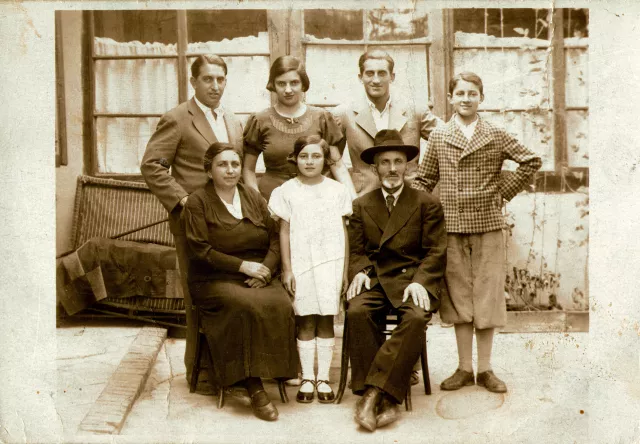This photograph was taken in the 1930s in Miskolc. The first figure from the right standing in knee pants is me. I believe, standing next to me, are Zoltan, Erzsebet and Miklos, my siblings. Sitting in front of us are my parents: my father, Samuel and my mother Rebeka. The girl standing between them is most likely the daughter of one of my older siblings, who didn't survive to the end of the war.
In 1930, the whole family moved to Miskolc because of the poverty. They hoped that from there, my father could earn more, market better, and this way making a living would be easier. We were able to stay in our first apartment for only six months, we couldn't pay the rent once in six months. During the six months, we just put it off, and put it off, and in the end, they let us go on the whole thing. Then we went to a much cheaper apartment. That also had two rooms, and there was veranda, the girls worked there. There was a proper courtyard, where the children could play, and we held get-togethers. Once my parents were cooking jam and we stirred the jam all night long. We held every holiday longer, and we went to the Kazinczy Street orthodox synagogue there.
I often went with my siblings to the Avas peak, and we walked over to Gorombolytapolca, which is now known by everybody as Miskolctapolca. It was a beautiful spa then as well, thought it wasn't as well-developed. On Saturday or Sunday many of my siblings and I relaxed there. We sat in the ice-cream shop in Gorombolytapolca where the bus went went out at that time, too. The printer's union had two billiard rooms, and we could go in there easily anytime. It was really good, we played for a candy bar or something like that. I went to the cinema a lot, and saw every film and every play in the theater.
Hitler's rise to power touched me in Miskolc. I already felt the troubled times in Miskolc. The 'turulmadaras' [The Turul Comrade Society formed in fall of 1919. One of the most popular and most powerful university comrade associations, it's members were law, medicine and humanities students. In reprisal for the abolition of the numerus clausus in 1927 which had banned Jews from university studies, they organized beatings of Jews on campuses (then effected the introduction of the 'numerus nullus' in 1941.] men were already in Miskolc. Later, during the time of the Gombos government, the anti-semitism became quite big. Then the politicians came in a row during the ministerial period of Imredy, then in the time of Daranyi, also. Minister Kallay was the most friendly [Bela Imredy was financial minister from 1932-1935, and prime minister from 1938-1939. Kalman Daranyi was prime minister from 1936-1938. Miklos Kallay was prime minister from 1942-1944.]
There was great alarm when Hitler was elected, and the winds of Fascism were blowing. We heard the German soldiers marching on the radio, since there was no television yet. And later in the cinema, you could see those German events. In 1938, they brought in the really big Jewish laws [Anti-Jewish laws in Hungary].
I was working as a free young assistant then, first in the shop of a Jewish couple named Salgo, then for the Quitt Lipot textile company. My father didn't have enough money to teach me a trade. I most would have liked to be an automechanic or dental technician, I looked into these two trades for myself. In the end, I went off to be a men's wear student in Miskolc [commerce schools], at one of the most elegant shops, where you could really learn intelligent commercial services. You had to respect the customers then, and really handle them. I was there until I finished my student years. Then I got a letter of freedom from my boss, in which he allowed me to finish earlier than the required three years. He said that I could easily start my career, and he'd gladly hire me if I stayed with him. Later, I did something else anyway. I had a really small position, I had to invoice the stock from the so-called heavy boys, I did the money collecting. It was the kind of position that I didn't do for the salary, but just for the little extra I got after I invoiced for the Quitt company in Miskolc. Later, in Pest I worked with textiles from my own energy, whatever I could, they called this 'honalj-kereskedelem' [Hungarian: 'armpit merchandising']. I sold bolts of textiles directly to sewing workshops and stores. I somehow got an industrial license out of that in 1942.
In May of 1936, the whole family had moved up to Budapest, to Paulay Ede Street to a rented apartment. My brother and my sister also came up to Pest, and settled here. The girls were seamstresses, my brother was a commerce assistant [Most likely this was his youngest older brother, Miklos]. They were the predecessors, and that's how I got from Miskolc to Pest also.
Family portrait with the first grandchild
The Centropa Collection at USHMM
The Centropa archive has been acquired by the United States Holocaust Memorial Museum in Washington, DC.
USHMM will soon offer a Special Collections page for Centropa.
Academics please note: USHMM can provide you with original language word-for-word transcripts and high resolution photographs. All publications should be credited: "From the Centropa Collection at the United States Memorial Museum in Washington, DC". Please contact collection [at] centropa.org.




